直接引语与间接引语之间的转换
直接引语和间接引语的转换

直接引语和间接引语的转换直接引语和间接引语是我们在日常生活中经常使用的两种引述方式。
直接引语是将别人的原话直接引用出来,用引号括起来;而间接引语是通过自己的表述方式来间接传达别人的原话。
在表达中,我们经常需要进行直接引语和间接引语的转换,以适应不同的情境和需要。
本文将探讨直接引语和间接引语的转换方法和要点。
1. 直接引语的转换为间接引语当我们需要将直接引语转换为间接引语时,需要注意以下几点:1.1改变人称和时态在转换为间接引语时,我们需要将直接引语中的人称和时态进行相应的改变。
例如,如果直接引语中的第一人称变成了第三人称,时态也要变化为与转述的时间点相符。
例子1:直接引语:他说:“我很喜欢这本书。
”间接引语:他说他很喜欢那本书。
1.2使用合适的引导动词和连词在引导直接引语变为间接引语时,我们需要使用合适的引导动词和连词,以使转述更加准确和连贯。
例子2:直接引语:她说:“我正在考虑是否要去旅行。
”间接引语:她说她正在考虑是否要去旅行。
2. 间接引语的转换为直接引语相比将直接引语转换为间接引语,将间接引语转换为直接引语则稍显复杂。
在进行转换时,需要注意以下要点:2.1恢复原话的语气和语态将间接引语转换为直接引语时,我们需要恢复原话的语气和语态。
这意味着使用引号将原话括起来,并使用准确的引述方式表达原话的内容。
例子3:间接引语:他说他会帮助我。
直接引语:他说:“我会帮助你。
”2.2注意引述方式和标点符号在转换为直接引语时,我们需要注意使用适当的引述方式和标点符号。
引述方式可以是引号括起来的原话,或者是以冒号引导的原话等。
例子4:间接引语:她说她很忙,没时间参加会议。
直接引语:她说:“我很忙,没时间参加会议。
”综上所述,直接引语和间接引语在书写和表达中起着重要的作用。
在进行转换时,需要注意改变人称和时态,使用合适的引导动词和连词,并恢复原话的语气和语态等要点。
通过掌握直接引语和间接引语的转换方法,我们可以更加准确地引用他人的观点,使表达更加清晰和有力。
直接引语和间接引语的转换技巧

直接引语和间接引语的转换技巧引语是指在文章中引用其他人的语言或观点来支持自己的论述。
在写作过程中,我们常常需要将别人的直接引语转换为间接引语,或者将间接引语转换为直接引语。
掌握正确的转换技巧可以使文章表达更加准确和流畅。
以下是直接引语和间接引语的转换技巧。
一、将直接引语转换为间接引语1. 改变人称和时态当将直接引语转换为间接引语时,要根据引语的内容改变人称和时态。
通常情况下,第一人称要改为第三人称,而时态则需要根据引语所述的时间进行调整。
例如,直接引语:“我喜欢读书。
”可以转换为间接引语:“他说他喜欢读书。
”2. 使用适当的引导词在引用别人的观点时,为了明确引语和原文之间的关系,常常需要使用适当的引导词。
常见的引导词包括:“说道”、“表示”、“认为”、“指出”等。
例如,直接引语:“我认为这个问题很重要。
”可以转换为间接引语:“他认为这个问题很重要。
”3. 修改动词的时态和语态在转换为间接引语时,有时候需要根据原文的动词时态和语态进行调整。
例如,直接引语:“我去了图书馆。
”可以转换为间接引语:“他说他已经去了图书馆。
”二、将间接引语转换为直接引语1. 删除引导词当将间接引语转换为直接引语时,通常可以删除引导词,使引语更加简洁明确。
例如,间接引语:“他说他没时间。
”可以转换为直接引语:“我没时间。
”2. 修改人称和时态在转换为直接引语时,要根据引语的内容修改人称和时态。
通常情况下,第三人称要改为第一人称,而时态则需要根据引语所述的时间进行调整。
例如,间接引语:“他说他去过中国。
”可以转换为直接引语:“我去过中国。
”3. 适当添加语气词和修饰词为了更好地表达原文的语气和意思,转换为直接引语时,可以适当添加语气词和修饰词。
例如,间接引语:“他说他很高兴。
”可以转换为直接引语:“我当时真的很高兴。
”总结:在转换直接引语和间接引语时,需要注意调整人称、时态和语气,并且使用适当的引导词。
通过灵活运用这些转换技巧,可以使文章更加丰富多样,语言表达更加准确清晰。
直接引语和间接引语的转换技巧

直接引语和间接引语的转换技巧引语在写作中扮演着重要的角色,不仅可以为文章增添立体感和说服力,还能够使读者更好地理解作者的观点。
在引语的使用中,我们常见的有直接引语和间接引语两种形式。
直接引语是将他人的语言原封不动地引用在文章中,而间接引语则是通过转述、改写的方式来表达他人的观点。
本文将分享一些转换直接引语和间接引语的技巧,以帮助读者在书写时更加灵活运用。
一、直接引语转换为间接引语1. 改变时间和人称直接引语中的动词时态和人称可以根据引用时所处的语境进行相应的变化。
例如直接引语中的现在时可以转换为过去时,一般过去时转换为过去完成时。
人称也需要根据语境作相应的变化。
例如:直接引语:他说:“我去过巴黎。
”间接引语:他说他去过巴黎。
2. 改变称谓和指示代词直接引语中的称谓和指示代词在转换为间接引语时需要根据上下文进行调整。
例如:直接引语:他对我说:“你应该关注你的学业。
”间接引语:他对我说我应该关注我的学业。
3. 改变疑问句和祈使句的语序在转换为间接引语时,疑问句和祈使句的语序需要改变。
例如:直接引语:他问:“你去哪里?”间接引语:他问我去哪里。
二、间接引语转换为直接引语1. 原词引述如果间接引语中的观点需要强调或者引用的内容比较简单直接,可以直接引用原词。
例如:间接引语:他说他很喜欢这本书。
直接引语:他说:“我很喜欢这本书。
”2. 省略词的补充如果在间接引语中省略了一部分内容,可以在直接引语中进行补充。
例如:间接引语:他告诉我他会来,但没有说具体的时间。
直接引语:他告诉我:“我会来,但没有说具体的时间。
”3. 结合原文进行引用如果原文中已经有了引号,并且需要引述其中的内容,可以在直接引语中使用引号。
例如:间接引语:他对我说他最喜欢的电影是《肖申克的救赎》。
直接引语:他对我说:“他最喜欢的电影是‘肖申克的救赎’。
”以上就是直接引语和间接引语的转换技巧。
通过灵活运用这些技巧,我们可以更好地在写作中引用他人的观点,并使文章更加生动有趣。
直接引语与间接引语的转换方法

直接引语与间接引语的转换方法直接引语和间接引语是表达他人说话或思想的两种常见方式。
直接引语是直接使用他人的原话或句子,用引号括起来;而间接引语是将他人的话或思想进行转述,不使用引号。
在合适的场合下,我们需要准确地转换直接引语和间接引语,以便更好地表达他人的意思。
本文将介绍直接引语与间接引语的转换方法。
一、直接引语转换为间接引语当我们需要将直接引语转换为间接引语时,我们需要注意以下几点:1. 改变引语的人称和时态:在转换为间接引语时,引语中的人称和时态通常要根据转述者的身份和转述的时间进行相应的改变。
例如,将直接引语"I am going to the park today"转换为间接引语时,可以改为She said that she was going to the park that day。
2. 引入动词“say”或其他同义词:在引述他人时,通常需要引入表示说话的动词“say”或其它同义词,以明确表达他人的发言。
当转换为间接引语时,通常将其放在转述的结构之前。
例如,将直接引语"He said, 'I like this book'"转换为间接引语时,可以改为He said that he liked that book。
3. 去掉引号和口语化表达:在转换为间接引语时,通常需要去掉直接引语的引号,并让表达更加正式和书面化。
例如,将直接引语"She said, 'I don't know'"转换为间接引语时,可以改为She said that she didn't know。
二、间接引语转换为直接引语当我们需要将间接引语转换为直接引语时,我们需要注意以下几点:1. 恢复引号:在将间接引语转换为直接引语时,需要在转述的原话或句子外添加引号,以表示这是他人的原话。
例如,将间接引语"He said that he liked the movie"转换为直接引语时,可以改为"He said, 'I like the movie'"。
英语直接引语与间接引语的转换
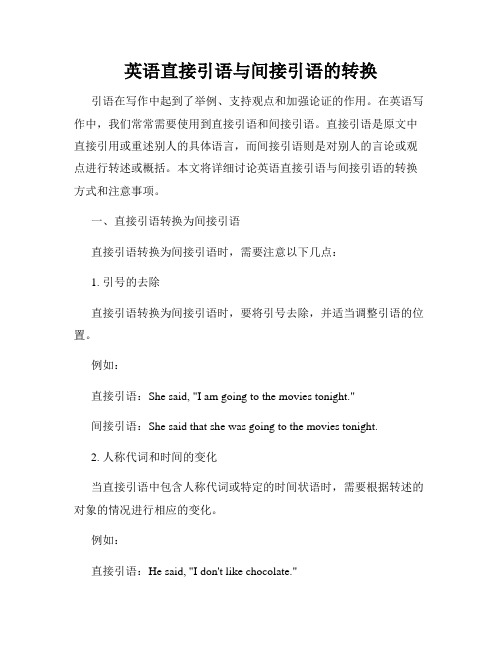
英语直接引语与间接引语的转换引语在写作中起到了举例、支持观点和加强论证的作用。
在英语写作中,我们常常需要使用到直接引语和间接引语。
直接引语是原文中直接引用或重述别人的具体语言,而间接引语则是对别人的言论或观点进行转述或概括。
本文将详细讨论英语直接引语与间接引语的转换方式和注意事项。
一、直接引语转换为间接引语直接引语转换为间接引语时,需要注意以下几点:1. 引号的去除直接引语转换为间接引语时,要将引号去除,并适当调整引语的位置。
例如:直接引语:She said, "I am going to the movies tonight."间接引语:She said that she was going to the movies tonight.2. 人称代词和时间的变化当直接引语中包含人称代词或特定的时间状语时,需要根据转述的对象的情况进行相应的变化。
例如:直接引语:He said, "I don't like chocolate."间接引语:He said that he didn't like chocolate.直接引语:She said, "I will visit my grandparents next week."间接引语:She said that she would visit her grandparents the following week.3. 动词语态的变化根据转述的对象的情况,有时需要对直接引语中的动词语态进行相应的变化。
例如:直接引语:He said, "I have finished my homework."间接引语:He said that he had finished his homework.4. 时态的变化转述的时态通常要比直接引语中的时态向过去倾斜。
例如:直接引语:She said, "I am reading a book."间接引语:She said that she was reading a book.直接引语:He said, "I will go shopping tomorrow."间接引语:He said that he would go shopping the next day.二、间接引语转换为直接引语间接引语转换为直接引语时,需要注意以下几点:1. 引号的添加将间接引语转换为直接引语时,需要在转述的部分前后添加引号。
直接引语与间接引语的转换技巧
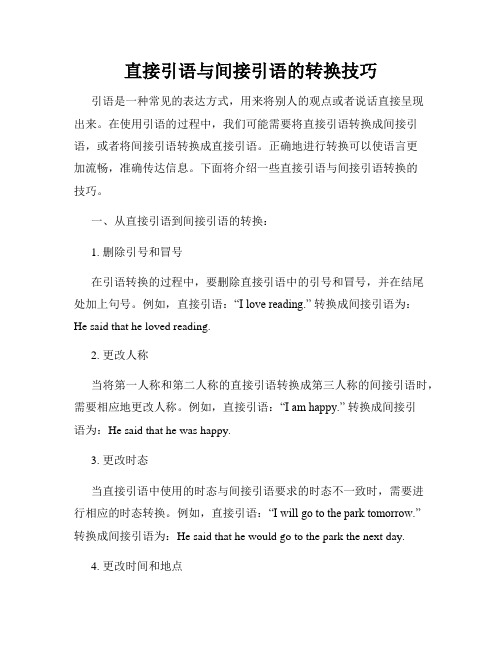
直接引语与间接引语的转换技巧引语是一种常见的表达方式,用来将别人的观点或者说话直接呈现出来。
在使用引语的过程中,我们可能需要将直接引语转换成间接引语,或者将间接引语转换成直接引语。
正确地进行转换可以使语言更加流畅,准确传达信息。
下面将介绍一些直接引语与间接引语转换的技巧。
一、从直接引语到间接引语的转换:1. 删除引号和冒号在引语转换的过程中,要删除直接引语中的引号和冒号,并在结尾处加上句号。
例如,直接引语:“I love reading.” 转换成间接引语为:He said that he loved reading.2. 更改人称当将第一人称和第二人称的直接引语转换成第三人称的间接引语时,需要相应地更改人称。
例如,直接引语:“I am happy.” 转换成间接引语为:He said that he was happy.3. 更改时态当直接引语中使用的时态与间接引语要求的时态不一致时,需要进行相应的时态转换。
例如,直接引语:“I will go to the park tomorrow.”转换成间接引语为:He said that he would go to the park the next day.4. 更改时间和地点在转换引语时,需要根据语境调整时间和地点的说法。
例如,直接引语:“I am going to the cinema tonight.” 转换成间接引语为:She said that she was going to the cinema that night.5. 更改连接词在转换引语的过程中,需要使用适当的连接词来引导引语和引语转换之间的关系。
例如,直接引语:“I think he is a good teacher.” 转换成间接引语为:She said that she thought he was a good teacher.二、从间接引语到直接引语的转换:1. 恢复引号和冒号在将间接引语转换成直接引语时,需要加上引号和冒号,并删除句末的句号。
语法直接引语和间接引语的转换

语法直接引语和间接引语的转换语法上,直接引语和间接引语是两种表达他人所说话的方式。
直接引语是将他人的原话直接引用并用引号包裹起来,而间接引语则是将他人的原话转述为自己的话,并无需使用引号。
在文中,我们将重点讨论如何将直接引语和间接引语进行转换。
一、直接引语的转换为间接引语在将直接引语转换为间接引语时,需要注意以下几点:1.人称和时态变化:在转述他人的话时,需要对人称和时态进行相应的变化。
比如,如果原话是第一人称现在时,转述为间接引语时则需要变为第三人称现在时。
例如,直接引语为:“I am happy。
”转换为间接引语时变为:“He said he was happy.”2.时间和地点的变化:如果直接引语中涉及到具体的时间和地点,转述为间接引语时可能需要相应的变化。
例如,直接引语为:“They will come here tomorrow.”转换为间接引语时变为:“He said they would go there the next day.”3.连词的使用:在将直接引语转换为间接引语时,通常需要在引述的话语前后添加引导词,如“he said”, “she told me”等。
这样可以让读者明确知道这句话是他人所说。
二、间接引语的转换为直接引语将间接引语转换为直接引语的时候,需要注意下面几点:1.去除引导词:转换为直接引语时,需要去除引导词。
比如,间接引语为:“He said he was happy.”转换为直接引语时变为:“I am happy.”2.准确引述:在转换为直接引语时,要准确引述原话,不要有任何改动。
这意味着要使用原话中的人称和时态,以及具体的时间和地点信息。
3.添加引号:直接引语需要使用引号将原话包裹起来,以示区别。
通过以上两种方式的转换,我们可以在写作中更加灵活地运用直接引语和间接引语。
不仅可以丰富文章内容,还可以更好地展示他人的观点和态度。
但是在使用时,我们要注意引述的准确性和适度,以避免误导读者或者带来不必要的歧义。
直接引语与间接引语的转换

直接引语与间接引语的转换直接引语与间接引语是在引述别人的话或思想时使用的两种方法。
直接引语是直接将他人的原话进行引用,而间接引语是通过转述的方式来表达别人的观点或陈述。
在写作中,我们经常需要使用这两种方式来引述他人的观点、研究结果或者其他重要的信息。
以下是有关直接引语与间接引语转换的相关参考内容:1. 直接引语转换为间接引语:当我们需要将直接引语转换为间接引语时,需要根据以下几个要点进行转换:- 动词的变化:将直接引语中的动词时态、人称等根据实际情况进行变化。
- 介词的转换:根据引用语上下文的需要,可能需要调整或更改一些介词的使用。
- 代词的变化:根据引用语上下文的需要,可能需要使用不同的代词来代替直接引语中的人称代词。
2. 间接引语转换为直接引语:当我们需要将间接引语转换为直接引语时,需要注意以下几个要点:- 动词的变化:将间接引语中的动词时态、人称等根据实际情况进行变化。
- 引号的使用:将间接引语中的内容用引号括起来,以表示这是直接引言的部分。
下面通过一个例子来说明如何进行直接引语与间接引语的转换:直接引语:John said, "I am going to the library."间接引语:John said that he was going to the library.在这个例子中,我们将原始的直接引语转换为间接引语。
注意到动词时态和代词的变化。
原先的直接引语中的动词 "am" 在间接引语中变为 "was",因为在时间上,John 说这句话的时间点是过去,而 "am" 表示现在时态。
原先的直接引语中的人称代词 "I" 在间接引语中变为 "he",因为我们在间接引语中是通过转述的方式来表达 John 的观点,所以要用第三人称替代。
总的来说,直接引语与间接引语的转换需要根据语境和语法规则来进行相应的调整。
间接引语和直接引语的转换

间接引语和直接引语的转换间接引语和直接引语是我们在日常交流和写作中常用到的两种引述方式。
间接引语是一种将他人的言论或想法转述为自己的陈述句的方式,而直接引语则是将他人的言论或想法以原话的形式进行引述。
在进行间接引语和直接引语的转换时,我们需要了解转述的原则、方法和注意事项。
一、间接引语的转换方法间接引语主要用于转述他人的观点、陈述或思想,常见的转换方法有以下几种:1.改变人称和时态:将直接引语中的人称、时态等变化为适合转述者自己的形式。
例如,直接引语为:“I will go to the party tonight.”,转换为间接引语时可以改为:“She said that she would go to the party tonight.”2.调整连接词:根据转述的需要,调整直接引语和转述语句之间的连接词。
常用的连接词包括that, whether, if等。
例如,直接引语为:“I don't know if he is coming or not.”,转换为间接引语时可以改为:“She said that she didn't know whether he was coming o r not.”3.改变句子结构:对于一些复杂的句子结构,可以根据需要进行简化或调整。
例如,直接引语为:“He said, 'I have never been to Paris, but I would love to go there someday if I have the chance.'”,转换为间接引语时可以改为:“He said that he had never been to Paris, but he would love to go there someday if he had t he chance.”二、直接引语的转换方法直接引语常用于援引他人的原话,在进行直接引语的转换时,需要注意以下几点:1.添加引号标示:将转述的内容用引号括起来,以区别于转述者自己的陈述。
语文中直接引语和间接引语互换的方法

语文中直接引语和间接引语互换的方法:1、改变人称,即第一人称(或第三人称)改为第三人称(或第一人称),如果原句中出现了第二人称,则改为双引号以外的具体人称。
2、改动标点符号,冒号与逗号互换,去掉或加入双引号。
3、如果遇到问句,则需要改为表示商量的祈使句。
4、增删个别词语,保证句子的流畅通顺。
一、直接引语转换为间接引语时,不管提示语在哪里(前、后、中),都应该将提示语写道前面来。
例:小明说:“下雨了,我今天不到奶奶家去。
”改为:小明说下雨了,他今天不到奶奶家去。
“下雨了,”小明说,“我今天不到奶奶家去。
”改为:小明说下雨了,他今天不到奶奶家去。
“下雨了,我今天不到奶奶家去。
”小明说。
改为:小明说下雨了,他今天不到奶奶家去。
1、标点符号的转换:直接引语转换成间接引语,标点符号遵循“两去两改”的原则。
去掉冒号和引号。
感叹号、问号都改成句号。
例:他笑着问小姑娘:“小朋友,拾到什么好东西?”改为:他笑着问小姑娘拾到什么好东西。
2、人称的转换:a、直接引语中出现了第三人称,改写为间接引语时,人称代词不用改变。
直接将句子整理通顺即可。
例:妈妈说:“小明到外婆家去了。
”改为:妈妈说小明到外婆家去了。
b、直接引语中出现了第一人称的时候,改写为间接引语时,要将第一人称改为第三人称。
例:小云说:“我不玩了。
”改为:小云说他不玩了。
C、直接引语中出现的是第二人称的时候,要将句中的第二人称改为第一人称。
例:妈妈这样说:“是啊,现在你是强者,是勇敢的人啦!”改为:妈妈说我现在是强者,是勇敢的人了。
d、直接引语中同时出现了不同人称的时候,就应该根据以上的各项进行改写。
例:老师十分和蔼地对她说:“我们为该剧设计了一个旁白,你的口齿清楚,音色柔美,希望你担任这个叙述者的角色。
”改为:老师十分和蔼地对她说他们为该剧设计了一个旁白,她的口齿清楚,音色柔美,希望她担任这个叙述者的角色。
直接引语和间接引语的转换方法

直接引语和间接引语的转换方法引语是我们在写作中经常会用到的一种表达方式,它可以为我们的观点提供支持和证明。
在引语的使用中,有两种常见的形式:直接引语和间接引语。
直接引语是将别人的原话直接引用过来,而间接引语则是将别人的原话进行转述。
在写作中,我们需要根据具体情况选择使用哪种引语形式,下面将介绍一些直接引语和间接引语的转换方法。
首先,我们来看直接引语的转换方法。
直接引语是将别人的原话直接引用过来,需要用引号将其包裹起来,并标明出处。
当我们需要转换直接引语时,可以通过以下几种方式进行。
1. 改变时态:当我们将直接引语转换为间接引语时,通常需要改变时态。
例如,直接引语中的现在时可以转换为间接引语中的过去时,直接引语中的过去时可以转换为间接引语中的过去完成时等。
这样做可以使引语与整个文章的时态保持一致。
2. 改变人称:在转换直接引语时,我们还需要根据引语所述的对象来改变人称。
例如,如果直接引语中的第一人称变为了第三人称,那么在转换为间接引语时,我们也需要相应地改变人称。
3. 改变语气:有时候,我们需要将直接引语转换为间接引语时,需要改变语气。
例如,直接引语中的疑问句可以转换为陈述句,直接引语中的祈使句可以转换为陈述句等。
这样做可以使引语更好地融入到我们的文章中。
接下来,我们来看间接引语的转换方法。
间接引语是将别人的原话进行转述,不需要使用引号,并且需要注明出处。
当我们需要将间接引语转换为直接引语时,可以通过以下几种方式进行。
1. 添加引号:当我们将间接引语转换为直接引语时,需要在原话的前后添加引号,以示区分。
这样做可以让读者清楚地知道这是别人的原话,而不是我们自己的观点。
2. 删除转述词:在转换间接引语为直接引语时,我们通常可以删除转述词。
例如,原来的间接引语可能是“他说道”,而在转换为直接引语时,我们可以直接将原话进行引用,不再需要使用转述词。
3. 注意语气和语调:当我们将间接引语转换为直接引语时,需要注意语气和语调的转换。
直接引语与间接引语的转换
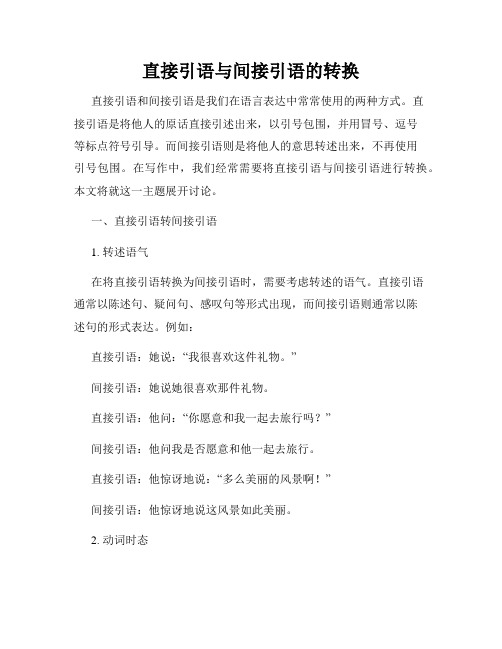
直接引语与间接引语的转换直接引语和间接引语是我们在语言表达中常常使用的两种方式。
直接引语是将他人的原话直接引述出来,以引号包围,并用冒号、逗号等标点符号引导。
而间接引语则是将他人的意思转述出来,不再使用引号包围。
在写作中,我们经常需要将直接引语与间接引语进行转换。
本文将就这一主题展开讨论。
一、直接引语转间接引语1. 转述语气在将直接引语转换为间接引语时,需要考虑转述的语气。
直接引语通常以陈述句、疑问句、感叹句等形式出现,而间接引语则通常以陈述句的形式表达。
例如:直接引语:她说:“我很喜欢这件礼物。
”间接引语:她说她很喜欢那件礼物。
直接引语:他问:“你愿意和我一起去旅行吗?”间接引语:他问我是否愿意和他一起去旅行。
直接引语:他惊讶地说:“多么美丽的风景啊!”间接引语:他惊讶地说这风景如此美丽。
2. 动词时态在将直接引语转换为间接引语时,也需要考虑动词时态的变化。
通常情况下,距离现在较远的过去事件需将直接引语的动词时态进行相应的变化。
例如:直接引语:他说:“我去过巴黎。
”间接引语:他说他曾去过巴黎。
直接引语:她说:“我正在看电影。
”间接引语:她说她当时正在看电影。
直接引语:他对她说:“我爱你。
”间接引语:他对她说他爱她。
3. 人称代词变化在将直接引语转换为间接引语时,还需要考虑人称代词的变化。
通常情况下,将直接引语中的人称代词根据上下文进行相应的变化。
例如:直接引语:他说:“我会帮助你。
”间接引语:他说他会帮助我。
直接引语:她说:“我们明天一起出发吧。
”间接引语:她说她们明天一起出发。
直接引语:我对他说:“你真聪明!”间接引语:我对他说他真聪明。
二、间接引语转直接引语有时候,我们也需要将间接引语转换为直接引语。
这种情况下,需将间接引语进行适当的调整。
例如:间接引语:他说他会帮助我。
直接引语:他说:“我会帮助你。
”间接引语:她说她明天会来。
直接引语:她说:“我明天会来。
”间接引语:他对我说他很忙。
直接引语:他对我说:“我很忙。
直接引语与间接引语的转换方法

直接引语与间接引语的转换方法引语在写作中经常用到,它可以增强文章的可信度和说服力。
在引用他人的观点或言论时,我们可以选择使用直接引语或间接引语。
直接引语是将原文中的具体内容直接引用,在文章中加引号并标注来源。
而间接引语则是通过自己的话来陈述他人的观点或言论。
在不同场景下,选择使用不同的引语形式可以让文章更具有效性。
以下将介绍直接引语与间接引语的转换方法。
一、直接引语转换为间接引语使用直接引语时,我们可以从原文中直接摘录作者的观点或言论。
然而,在一些情况下,我们可能需要将直接引语转换为间接引语,以适应文章的需要或改变语气。
转换的方法如下:1.使用“that”引导的从句当直接引语是一句陈述或一般性的观点时,可以将其转换为由“that”引导的从句。
例如,直接引语“'I love this book,' he said.”可以转换为间接引语“He said that he loved that book.”2.变换人称和时间将直接引语中的人称和时间根据上下文进行调整,使其保持一致。
例如,“'I will go to the concert,' she said.”可以转换为间接引语“She said that she would go to the concert.”3.使用动词“say”的同义词为了使文章表达更加丰富,可以使用动词“say”的同义词来替换原文中的引语表达。
例如,“'I am very happy,' he said.”可以转换为间接引语“He exclaimed that he was extremely delighted.”二、间接引语转换为直接引语间接引语是通过自己的话来陈述他人的观点或言论,为了提高文章的可读性和真实感,我们可以选择将间接引语转换为直接引语。
转换的方法如下:1.去除引号和标点符号将间接引语中的引号和标点符号去除,并加上适当的标点符号来引出直接引语。
直接引语和间接引语的转换
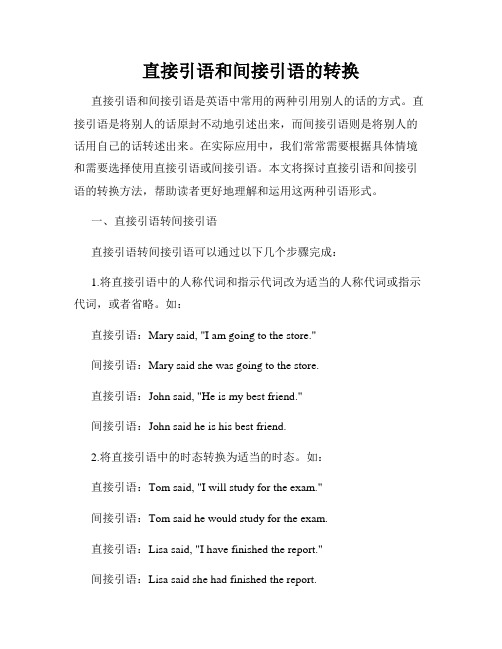
直接引语和间接引语的转换直接引语和间接引语是英语中常用的两种引用别人的话的方式。
直接引语是将别人的话原封不动地引述出来,而间接引语则是将别人的话用自己的话转述出来。
在实际应用中,我们常常需要根据具体情境和需要选择使用直接引语或间接引语。
本文将探讨直接引语和间接引语的转换方法,帮助读者更好地理解和运用这两种引语形式。
一、直接引语转间接引语直接引语转间接引语可以通过以下几个步骤完成:1.将直接引语中的人称代词和指示代词改为适当的人称代词或指示代词,或者省略。
如:直接引语:Mary said, "I am going to the store."间接引语:Mary said she was going to the store.直接引语:John said, "He is my best friend."间接引语:John said he is his best friend.2.将直接引语中的时态转换为适当的时态。
如:直接引语:Tom said, "I will study for the exam."间接引语:Tom said he would study for the exam.直接引语:Lisa said, "I have finished the report."间接引语:Lisa said she had finished the report.直接引语:David asked, "Where are you going?"间接引语:David asked where she was going.直接引语:Sarah asked, "When will the meeting start?"间接引语:Sarah asked when the meeting would start.二、间接引语转直接引语间接引语转直接引语可以通过以下几个步骤完成:1.将间接引语中的人称代词和指示代词改为适当的人称代词或指示代词。
直接引语和间接引语的转换方法

直接引语和间接引语的转换方法直接引语和间接引语是日常交流和写作中常用的两种引述语句的方式。
直接引语是直接使用原话进行引述,而间接引语则是将原话转述为自己的表述方式。
本文将介绍直接引语和间接引语之间的转换方法。
一、直接引语直接引语是将别人的原话直接引用,并用引号将其包围。
在直接引语中,需要将原话中的句号、问号、感叹号等标点符号原样保留,并将引用内容部分用引号起来。
例如:她说:“我正在阅读一本很有趣的书。
”他大声地喊道:“这是我最喜欢的音乐!”“你在哪里?”他问道。
二、间接引语间接引语是将别人的原话转述为自己的句子,并没有直接使用引号。
在间接引语中,需要将直接引语转换为自己的陈述,同时还要注意动词和时态的调整。
例如:她说她正在阅读一本很有趣的书。
他大声地喊道这是他最喜欢的音乐!他问他在哪里。
三、直接引语转间接引语的步骤在将直接引语转换为间接引语时,需要进行以下步骤:1. 将引号去掉。
2. 将引述内容转述为自己的句子。
3. 调整动词和时态。
例如:直接引语:他说:“我很喜欢这个城市。
”间接引语:他说他很喜欢这个城市。
直接引语:她问:“你有没有参加过音乐会?”间接引语:她问他是否参加过音乐会。
四、间接引语转直接引语的步骤将间接引语转换为直接引语时,可以按照以下步骤进行转换:1. 将引述内容用引号起来。
2. 调整动词和时态。
3. 加入问号或感叹号等标点符号。
例如:间接引语:他说他很喜欢这个城市。
直接引语:他说:“我很喜欢这个城市。
”间接引语:她问他是否参加过音乐会。
直接引语:她问:“你有没有参加过音乐会?”五、特殊情况和注意事项1. 当间接引语中有时间、地点等陈述时,需要相应地调整。
例如:直接引语:他说:“我明天要去北京。
”间接引语:他说他明天要去北京。
2. 当直接引语中有第一人称时,需要将第一人称改为第三人称。
例如:直接引语:我说:“我很高兴见到你。
”间接引语:我说我很高兴见到他。
3. 切勿改变原话的含义,要准确地转述对方的原话。
直接引语和间接引语的转换方法

直接引语和间接引语的转换方法直接引语和间接引语是英语中常见的两种引述方式。
直接引语是将某人的原话直接用引号括起来,而间接引语则是将他人的话转述出来。
在英语写作中,我们经常需要进行直接引语和间接引语的转换。
本文将介绍关于直接引语和间接引语的转换方法。
一、直接引语的转换为间接引语当我们需要将直接引语转换为间接引语时,需要注意以下几点:1. 主要变化:将引号去掉,改为使用"that"引导从句。
例如:直接引语:“I am going to the park,” she said.间接引语:She said that she was going to the park.2. 时态变化:根据引语所表示的时间改变时态。
例如:直接引语:“I am studying English,” he said.间接引语:He said that he was studying English.3. 人称变化:根据引语所表示的人称改变人称。
例如:直接引语:“I will help you,” he said.间接引语:He said that he would help me.4. 指示变化:根据引语中的指示词改变指示词。
例如:直接引语:“This is a book,” she said.间接引语:She said that that was a book.5. 修饰变化:根据引语中的修饰词改变修饰词。
例如:直接引语:“I love this beautiful city,” she said.间接引语:She said that she loved that beautiful city.二、间接引语的转换为直接引语当我们需要将间接引语转换为直接引语时,需要注意以下几点:1. 去除“that”:将从句中的"that"去除。
例如:间接引语:She said that she was busy.直接引语:“I am busy,” she said.2. 时态变化:根据引语所表示的时间改变时态。
直接引语与间接引语的转换

直接引语与间接引语的转换直接引语(direct speech)是指直接重述他人的原话或原句,在引语的两侧使用引号标示。
而间接引语(indirect speech)则是以自己的话转述他人的原话或原句。
直接引语与间接引语的转换在日常生活和写作中经常会遇到。
本文将探讨直接引语与间接引语的转换规则以及相应的例子。
转换规则:1. 直接引语转换为间接引语时,需将引号去掉。
例如:直接引语:他说,“我明天会去旅行。
”间接引语:他说他明天会去旅行。
2. 当直接引语中的动词为一般现在时,转换为间接引语时需根据情况使用相应的时态。
例如:直接引语:他说,“我喜欢吃苹果。
”间接引语:他说他喜欢吃苹果。
3. 当直接引语中的动词为一般过去时,转换为间接引语时需将时间状语一同转换。
例如:直接引语:他说,“我昨天买了一本新书。
”间接引语:他说他昨天买了一本新书。
4. 当直接引语中存在第三人称时,转换为间接引语时需根据情况进行相应的代词转换。
例如:直接引语:他说,“我是工程师。
”间接引语:他说他是工程师。
5. 当直接引语中使用了口头表示法(如问句、感叹句等),转换为间接引语时需改为陈述句。
例如:直接引语:他问我,“你明天准备去哪里?”间接引语:他问我他明天准备去哪里。
下面是一些例句来帮助理解直接引语与间接引语的转换过程:1. 直接引语:他说,“我很喜欢这本书。
”间接引语:他说他很喜欢那本书。
2. 直接引语:她对我说,“我已经吃过晚饭了。
”间接引语:她对我说她已经吃过晚饭了。
3. 直接引语:他问我,“你今天要去看电影吗?”间接引语:他问我我今天要不要去看电影。
4. 直接引语:他说,“我会努力学习英语。
”间接引语:他说他会努力学习英语。
5. 直接引语:她告诉我们,“我曾经去过巴黎。
”间接引语:她告诉我们她曾经去过巴黎。
总结起来,直接引语与间接引语的转换需要注意时态、代词和修饰词等方面的变化。
通过熟悉和掌握这些转换规则,我们可以在日常交流和写作中更好地运用直接引语与间接引语,准确传达他人的言论和思想。
直接间接引语的转换
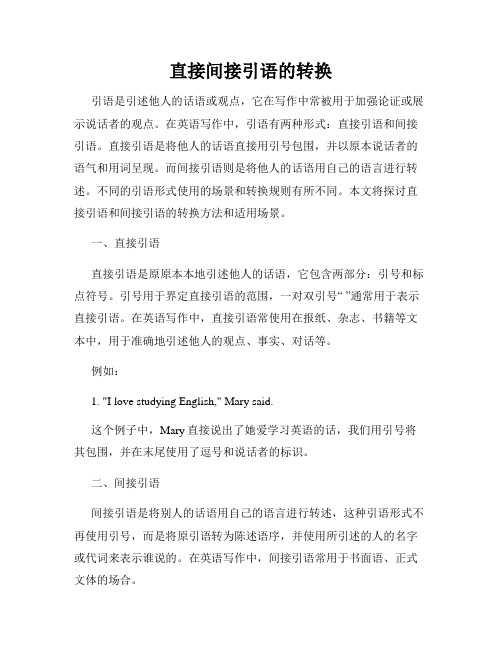
直接间接引语的转换引语是引述他人的话语或观点,它在写作中常被用于加强论证或展示说话者的观点。
在英语写作中,引语有两种形式:直接引语和间接引语。
直接引语是将他人的话语直接用引号包围,并以原本说话者的语气和用词呈现。
而间接引语则是将他人的话语用自己的语言进行转述。
不同的引语形式使用的场景和转换规则有所不同。
本文将探讨直接引语和间接引语的转换方法和适用场景。
一、直接引语直接引语是原原本本地引述他人的话语,它包含两部分:引号和标点符号。
引号用于界定直接引语的范围,一对双引号“ ”通常用于表示直接引语。
在英语写作中,直接引语常使用在报纸、杂志、书籍等文本中,用于准确地引述他人的观点、事实、对话等。
例如:1. "I love studying English," Mary said.这个例子中,Mary直接说出了她爱学习英语的话,我们用引号将其包围,并在末尾使用了逗号和说话者的标识。
二、间接引语间接引语是将别人的话语用自己的语言进行转述,这种引语形式不再使用引号,而是将原引语转为陈述语序,并使用所引述的人的名字或代词来表示谁说的。
在英语写作中,间接引语常用于书面语、正式文体的场合。
例如:1. Mary said that she loved studying English.这个例子中,我们使用间接引语将Mary的原始话语转述为间接引语,去掉了引号,在句首使用了Mary的名字来表示谁说的。
三、直接引语和间接引语的转换规则在实际应用中,我们通常需要在直接引语和间接引语之间进行转换。
下面是一些常见的转换规则及例句:1. 直接引语转间接引语:- 时态转换:直接引语中的动词时态需要根据上下文进行转换。
- "I will go to the party," he said.- He said that he would go to the party.- 人称转换:直接引语中的人称需要根据转换后的引语说话者来确定。
直接引语和间接引语的转换
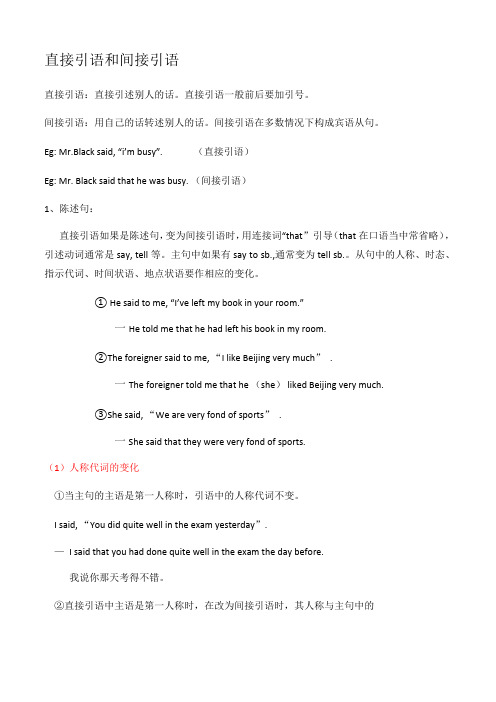
直接引语和间接引语直接引语:直接引述别人的话。
直接引语一般前后要加引号。
间接引语:用自己的话转述别人的话。
间接引语在多数情况下构成宾语从句。
Eg: Mr.Black said, “i’m busy”.(直接引语)Eg: Mr. Black said that he was busy. (间接引语)1、陈述句:直接引语如果是陈述句,变为间接引语时,用连接词“that”引导(that在口语当中常省略),引述动词通常是say, tell等。
主句中如果有say to sb.,通常变为tell sb.。
从句中的人称、时态、指示代词、时间状语、地点状语要作相应的变化。
① He said to me, “I’ve left my book in your room.”一He told me that he had left his book in my room.②The foreigner said to me, “I like Beijing very much” .一The foreigner told me that he (she) liked Beijing very much.③She said, “We are very fond of sports” .一She said that they were very fond of sports.(1)人称代词的变化①当主句的主语是第一人称时,引语中的人称代词不变。
I said, “You did quite well in the exam yesterday”.—I said that you had done quite well in the exam the day before.我说你那天考得不错。
②直接引语中主语是第一人称时,在改为间接引语时,其人称与主句中的主语的人称一致。
He said to Tom, “I'll do my best to catch up with others”.—He told Tom that he would do his best to catch up with others.他告诉汤姆他将尽他所能赶上其他人。
- 1、下载文档前请自行甄别文档内容的完整性,平台不提供额外的编辑、内容补充、找答案等附加服务。
- 2、"仅部分预览"的文档,不可在线预览部分如存在完整性等问题,可反馈申请退款(可完整预览的文档不适用该条件!)。
- 3、如文档侵犯您的权益,请联系客服反馈,我们会尽快为您处理(人工客服工作时间:9:00-18:30)。
【本讲教育信息】一. 教学内容:直接引语和间接引语及宾语从句二、教学重点直接引语和间接引语及宾语从句三、本讲重点知识讲解:直接引语与间接引语复习要点(一)、概念:直接引述别人的原话,叫直接引语。
用自己的话转述别人的话,叫间接引语。
直接引语一般前后要加引号,间接引语不用引号。
直接引语变为间接引语时,多数情况下构成宾语从句或复合宾语。
如:直接引语: He often says, “China is great.”间接引语: He often says that China is great.(二) 直接引语转化成间接引语:1. 如何变人称:下面有一句顺口溜“一随主,二随宾,第三人称不更新”。
“一随主”是指在直接引语变间接引语时,如果从句中的主语是第一人称或被第一人称所修饰。
从句中的人称要按照主句中主语的人称做相应变化。
如:She said, “My brother wants to go with me.” →She said her brother wanted to go with her.“二随宾”是指直接引语变间接引语时,若从句中的主语及宾语是第二人称或被第二人称所修饰。
从句中的人称要跟引号外的主句的宾语一致。
如果引号外的主句没有宾语。
也可以用第一人称。
如:He said to Kate. “How is your sister now?” →He asked Kate how her sister was then。
“第三人称不更新”是指直接引语变间接引语时。
如果从句中的主语及宾语是第三人称或被第三人称所修饰,从句中的人称一般不需要变化。
如:Mr Smith said, “Jack is a good worker.” →Mr Smith said Jack was a good worker。
2. 如何变时态:直接引语在变为间接引语时,时态需要作相应的调整。
(1)一般现在时变为一般过去时(2)现在进行时变为过去进行时(3)一般将来时变为过去将来时(4)现在完成时变为过去完成时(5)一般过去时变为过去完成时(6)过去完成时不变,仍为过去完成时现在时态需改为过去时态;过去时态改为完成时态;过去完成时态则保留原来的时态。
如:1) She said, “I have lost a pen.” →She said she had lost a pen.2) She said, “We hope so.”→She said they hoped so.3) She said, “He will go to see his friend.” →She said he would go to see his friend.但要注意在以下几种情况下,直接引语变为间接引语时,时态一般不变化。
①直接引语是客观真理。
“The earth moves around the sun and the moon moves around the earth,” the teacher told me.→The teacher told me the earth moves around the sun and the moon moves around the earth.②直接引语是过去进行时时,时态不变。
如:Jack said, “John, where were you going when I met you in the street?”→Jack asked John where he was going when he met him in the street.③直接引语中有具体的过去某年、某月、某日作状语,变为间接引语时,时态不变。
如:Xiao Wang said, “I was born on April 2l, 1980.”→Xiao Wang said he was born on April 21, 1980.④直接引语如果是一般现在时,表示一种反复出现或习惯性的动作,变间接引语时,时态不变。
如:He said, “I get up at six every morning.” →He said he gets up at six every morning.⑤如果直接引语中的情态动词没有过去时的形式(例:ought to,had better, used to)和已经是过去时的形式时,(例:could, should, would, might)时态不变。
如:Peter said, “You had better come here today.” →Peter said I had better go there that day.3. 如何变状语:直接引语变间接引语,状语变化有其内在规律,时间状语由“现在”改为“原来”(例:now变为then, yesterday变为the day before);地点状语,尤其表示方向性的,或由指示代词修饰的状语,由“此”改为“彼”(例:this 改为that),如:He said, “These books are mine.” →He said those books were his.4. 如何变句型:①直接引语如果是陈述句,间接引语应改为由that引导的宾语从句。
如:She said, “Our bus will arrive in five minutes.”→She said that their bus would arrive in five minutes.②直接引语如果是反意疑问句,选择疑问句或一般疑问句,间接引语应改为由whether 或if引导的宾语从句.如:He said, “Can you swim, John?”→He asked John if he could swim.“You have finished the homework, haven’t you?” my mother asked.→My mother asked me whether I had finished the homework.“Do you go to school by bus or by bike?” he asked.→He asked me if I went to school by bus or by bike.③直接引语如果是特殊问句,间接引语应该改为由疑问代词或疑问副词引导的宾语从句(宾语从句必须用陈述句语序)。
She asked me, “When do they have their dinner?”→She asked me when they had their dinner.④直接引语如果是祈使句,间接引语应改为“tell(ask, order, beg等) sb. (not) to do sth.”句型。
如:“Don’t make any noise,” she said to the children.→She told (ordered) the children not to make any noise.“Bring me a cup of tea, please,” said she.→She asked him to bring her a cup of tea.5.如果主句谓语动词为各种现在时或一般将来时,则间接引语中的动词仍保持直接引语原来的时态。
如果主句谓语动词为过去时态,间接引语中的动词时态按下列变化: [注意](1)如果直接引语表示客观真理,变为间接引语时,一般现在时不改为一般过去时。
如:The teacher said “The earth goes round the sun.”→The teacher said that the earth goes round the sun.(2)如果直接引语中有明确表示过去时间的状语,变为间接引语时,一般过去时不改为过去完成时。
如:He said to me, “I was born in 1973.”→He told me that he was born in 1973.(3)如果直接引语所述事实在当时和目前同样生效,变为间接引语时,一般现在时不改为一般过去时。
如:He said, “I’m a boy, not a girl.”→He said that he is a boy ,not a girl.(4)如果直接引语中的谓语动词表示一种反复出现或习惯的动作,在变为间接引语时,一般现在时不改为一般过去时。
如:The girl said, “I get up at six every morning.”→The girl said that she gets up at six every morning.(5)如果直接引语中含有since, when, while 引导的表示过去时间的状语从句,在变为间接引语时,只改变主句中的谓语动词,从句的一般过去时则不变。
如:He said to me, “I have taught English since he came here.”→He told me that he had taught English since he came here.(6)如果直接引语中含有情态动词must, need, had better以及情态动词的过去式could, might, should, would,在变为间接引语时,这些情态动词没有时态的改变。
例如:The teacher said to me, “You must pay more attention to your pronunciation.”→The teacher told me that I must (have to ) pay more attention to my pronunciation.He said, “I could swim when I was only six.”→He said that he could swim when he was only six.6.代词等一般地应做相应的变化。
指示代词this ---thatthese--- those表示时间的词now —then today—that daythis week(month ,etc) —that week (month ,etc)yesterday —the day beforelast week(month) —the week(month) beforethree days(a year)ago—three days(a year)beforetomorrow —the next (following ) daynext week(month)—the next(following)week(month)表地点的词here —there动词bring —takecome —go【典型例题】1. Our teacher asked us _B_ our dictionaries to school.A. bringB. broughtC. bringsD. to bring2. The teacher told the boy students ____ football on the grass.A. not playB. not to playC. playedD. playing3. ____ Tom didn’t go to school?A. Do you know howB. Why do you knowC. How you know whyD. Do you know why44. She looks sad. Could you please tell me__ that prevents her from being as happy as before?A. what it isB. it is whatC. how it isD. it is how5. Betty asked her sister ___ to the railway station to see her off.A. not to comeB. not to goC. to not comeD. to not go6. The pupil asked his teacher ____ round the earth.A. weather the moon goesB. that the moon wentC. whether the moon goesD. whether the moon went7. Mr. Li ____ Wang Ling ____ a taxi to the airport.A. asked; takeB. asked; takingC. told; takeD. told; to take8. She asked him ____.A. whose dictionary this isB. whose dictionary that wasC. whose dictionary is thisD. whose dictionary that is9. Mary’s mother asked her _____.A. that whether she had finished her homeworkB. if she has finished her homeworkC. if she had finished her homeworkD. that if she had finished her homework10. Do you know ____?A. what is he doingB. what he doingC. what he is doingD. what does he do now11. I don’t know ____ to learn English.A. when did he beginB. when he beganC. he when beganD. when he begins12. He asked me ____.A. how would the weather be like tomorrowB. what the weather would be like the next dayC. how the weather would be like tomorrowD. what would the weather be like the next day13. You can’t imagine ____ when they received these nice Spri ng Festival presents.A. how excited they wereB. how excited were theyC. how they were excitedD. they were how excited14. She told me that she ____ by her relatives at the bus stop.A. had been seen offB. have seen offC. have been seen offD. had seen off15. Do you remember how many times ____ to Australia?A. had you beenB. did you goC. have you beenD. you have been16. Can you guess ____?A. what is that manB. who that man isC. whom that man isD. who is that man17. More and more students and teachers have began to know ____.A. how important the foreign language areB. how the foreign language is importantC. how important the foreign language isD. how important is the foreign language18. The hostess said that it ___ time that they ___ supper.A. was; hadB. was; had hadC. is; haveD. is; have had19. The boss asked his secretary ____ he had finished typing the report ____.A. if; or notB. if; notC. whether; or notD. whether; not20. I wonder how much _____.A. does he spend on his carB. did he spend on his carC. he spent on his carD. he spent in his car【模拟试题】(答题时间:80分钟)I. 请选出正确的答案:1. Where was Alice’s sister? I don’t know where ________.A. was Alice’s sisterB. Alice’s sister wasC. is Alice’s sisterD. Alice’s sister is2. What did he say? I don’t know what _________.A. did he sayB. he saysC. he has saidD. he said3. I don’t know ___________.A. the reason why can beB. why the reason may beC. what the reason can beD. what the reason may be4. Is Mr. Wu from Beijing? I don’t know ________.A. where does he come fromB. from where does he comeC. which city he comes fromD. what city he comes from5. Can you make sure ___________?A. that he will come here todayB. when he will come here todayC. will he come here todayD. whether will he come here today6. Do you happen to know ________?A. where is her addressB. in which place is her addressC. what her address isD. the place her address is7. Excuse me, but can you tell me ___________?A. where can I get to the libraryB. where I can get to the libraryC. how can I get to the libraryD. how I can get to the library8. John asked me _______ to visit his uncle’s farm with him.A. how would I likeB. if or not would I likeC. whether I would likeD. which I would like9. I’d like to know ________ Chinese.A. when he began to learnB. when did he begin to learnC. when did he begin learningD. for how long he began to learn10. I don’t know _________ he will come tomorrow. _________ he comes, I’ll tell you.A. if; WhetherB. whether; WhetherC. if; ThatD. if; If11. I don’t know _________ the day after tomorrow.A. when does he comeB. how will he comeC. if he comesD. whether he’ll come12. Could you tell me _________ the nearest hospital is?A. whatB. howC. whetherD. where13. Could you tell me _________ the radio without any help?A. how did he mendB. what did he mendC. how he mendedD. what he mended14. I want to know _________.A. whom is she looking afterB. whom she is lookingC. whom is she lookingD. whom she is looking after15. Do you know where _________ now?A. he livesB. does he liveC. he livedD. did he live16. Do you know what time _________?A. the train leaveB. does the train leaveC. will the train leaveD. the train leaves17. I don’t know _________. Can you tell me, please?A. how the two players are oldB. how old are the two playersC. the two players are how oldD. how old the two players are18. The small children don’t know _________.A. what is their stockings inB. what is in their stockingsC. where is their stockings inD. what in their stockings19. I can’t understand _________.A. what does Christmas meanB. what Christmas does meanC. what mean Christmas doesD. what Christmas meansⅡ. 句型变换,每空一词:1. “I never eat meat.” he said. (改为间接引语)He said that ______ never ______ meat.2. “I’ve found my wallet.” he said to me. (改为间接引语)He ______ me that he ______ ______ ______ wallet.3. “I took it home with me.” she said. (改为间接引语)She said that ______ ______ _______ it home with her.4. The teacher said, “The sun rises in the east and goes down in the west.” (改为间接引语)The teacher said that the sun ______ in the east and ______ down in the west.5. “I met her yesterday.” he said to me. (改为间接引语)He ______ me that he ______ met her the day ______.6. “You must come here before five.” he said.(改为间接引语)He said that I ______ to go ______ before five.7. “I bought the house 10 years ago.” he said. (改为间接引语)He said that he _______ bought the house 10 years _______.8. “Did you see her last week?” he said. (改为间接引语)He ______ ______ I had seen her the week _______.9. He said, “You can sit here, Jim.” (改为间接引语)He ______ Jim that he ______ sit there.10. He asked, “How did you find it, mother?” (改为间接引语)He asked her mother ______ ______ ______ found it.11. “Where have you been these days?” he asked. (改为间接引语)He asked me _______ _______ _______been _______ days.12. “Do you know where she lives?” he asked. (改为间接引语)He asked ______ ______ knew where she ______.13. “Stop making so much noise, children.” he said.(改为间接引语)He ______ the children ______ ______ making so much noise.14. “Don’t tell him the news.” she said. (改为间接引语)She told me _______ ______ ______ him the news.15. “Are you interested in this?” he said. (改为间接引语)He ______ ______ I was interested in ______.16. Does Mr. Brown enjoy living in China? Could you tell us?(合并句子)→Could you tell us _________ Mr. Brown _________ living in China?17. “Does the girl need any help?” he asked me.(变为复合句)→He asked me _________ the girl _________ some help.18. Jim is not a student. Tom is not a student, either.(合并为一个句子)_________ Jim _________Tom is a student.19. When does the train leave? I want to know.(改为含宾语从句的复合句)I want to know _________ the train _________.20. They went home after they had finished their homework. (用not...until改写)They _________ go home _________ they had finished their homework.21. Did Peter come here yesterday? Li Lei wants to know. (改为含宾语从句的复合句)Li Lei wants to know _________ Peter _________ here yesterday.Ⅲ将下列句子变为间接引语:1. “You should be more careful next time,” his father said to him.2. Mr. Wang said, “I will leave for Shanghai on business next month, children.”3. “I haven’t heard from my parents these days,” said Mary.4. The geography teacher said to us, “The moon moves around the ea rth and the earth goes round the sun.”5. She said to him, “It’s time that you left here.”6. Zhang Hong said to me, “Doctor Wang passed away in 1948.”7. John said to his parents, “I had learned 500 Chinese words by the end of last term.”8. The history t eacher said to them, “The Chinese Communist Party was founded on July 1st, 1921.”9. He said, “Are you a student?”10. “Have you anything interesting I can read, George?” she said.11. “She’s here to ask for help, isn’t she?” he asked.12. “Where are you going?” the father asked his son.13. “Are you sorry for what you have done?” the mother asked the naughty boy.14. She said, “Did you meet this man at the station two hours ago, Mr. Li?”15. “Write your names on your papers first,” the teacher said to us.16. “Please come here again tomorrow,” her friend said to her.17. “Let me pack the parcel for you,” he said.18. “Don’t make so much noise in class, boys and girls,” said the teacher.19. “What a lovely day it is!”20. “Happy New Year to you!” he said.【试题答案】I. 1~4 B D C C 5~9 A C D C A 10—14 DDDCD 15—19 ADDBDII.1. he, ate2. told, had found his3. she had taken4. rises, goes5. told, had, before6. had, there7. had, before8. asked if (whether), before9. told, could10. how she had11. where I had, those12. if (whether) I, lived13. told, to stop14. not to tell15. asked if (whether), that16. if/whether; enjoys17. if/whether; needed18. Neither; nor19. when; leaves20. didn’t; until21. whether; cameIII.1. His father told him that he should be more careful the next time.2. Mr. Wang told the children that he would leave for Shanghai on business the next month.3. Mary said that she hadn’t heard from her parents those days.4. The geography teacher told us that the moon moves around the earth and the earth goes round the sun.5. She told him that it was time that he left there.6. Zhang Hong told me that Doctor Wang passed away in 1948.7. John told his parents that he had learned 500 Chinese words by the end of last term.8. The history teacher told them that the Chinese Communist Party was founded on July 1st, 1921.9. He asked whether I was a student.10. She asked George if he had anything interesting she could read.11. He asked whether she was there to ask for help or not.12. The father asked his son where he was going.13. The mother asked the naughty boy if he was sorry for what he had done.14. She asked Mr. Li whether he had met that man at the station two hours before.15. The teacher told us to write our names on our papers first.16. Her friend asked her to go there again the next/ following day.17. He offered to pack the parcel for me.18. The teacher told the boys and girls not to make so much noise in class.19. He/ She exclaimed that it was really a lovely day.20. He wished me a Happy New Year.。
